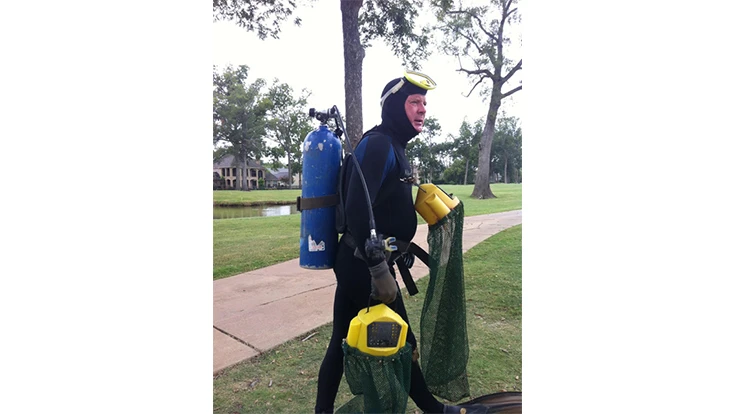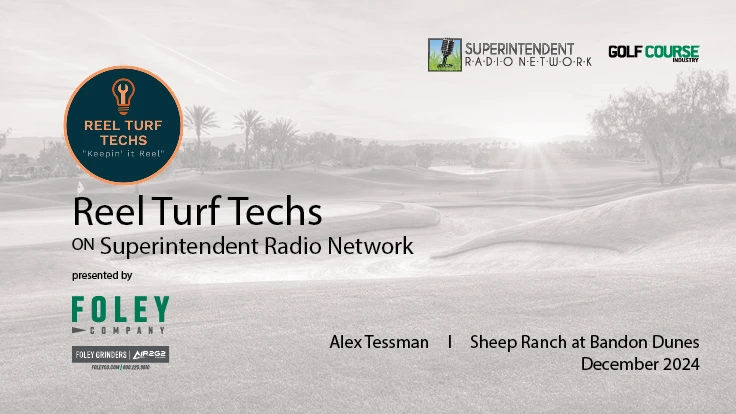
About 8,000 venomous snakebites occur in the United States each year, a fact that’s always on the minds of hundreds of golf ball divers – a unique group of divers who collect the millions of golf balls lost on golf courses each year. It’s especially on the minds of those divers who work on courses where venomous snakes live, and it’s certainly a fact that golf ball diver Brett Parker never forgets.
“So, I’m done diving for golf balls for the day and stop to rinse off my hands at the edge of a pond,” Parker said. “Suddenly I see a like-new Titleist Pro V1 right there ... only a couple inches under the water. Too good to pass up, I reach for it, and just as I put my hand in, I notice an odd ‘pattern’ under the water. But it was too late.”
The pattern was the back markings of a four-foot long water moccasin right under the surface. It locked onto Parker’s hand and wrapped itself around his arm forcing Parker to rip it off. A trip to the hospital for a big dose of anti-venom followed.
Despite the less-than-ideal, dangerous and always dirty conditions golf ball divers like Parker work under, this unique job is more than that – it’s a passion. And it’s a passion that needed protecting - beyond a dose of anti-venom.
As golf ball divers began to receive less and less payment per ball from big used golf ball resellers, a group of golf ball divers decided in 2016 to form the Golf Ball Divers Alliance (GBDA), America’s first cooperative of golf ball divers. They did so with the help of Cooperative Management Group (CMG), which identifies industries in need of a coop and partners with independent businesses and entrepreneurs within those industries to help them build cooperatives that members own and control.
Cooperatives are a proven way to help independent businesses stay strong. There are about 30,000 cooperatives in the United States with over 350,000 members. They support small businesses and entrepreneurs in almost every industry – from craft beer brewers (Independent Brewers Alliance) to hardware stores (Ace Hardware) to cranberry farmers (Ocean Spray). “Think of it like this, instead of harvesting and selling our own cranberries, we harvest and sell our own golf balls,” Parker said.
Members of the GBDA retrieve balls as they always have, but instead of selling to big resellers, the GBDA processes and packages the retrieved balls under their own brand name. The balls are sold online through the GBDA’s branded e-commerce site (golfballdivers.com) with the profit going to GBDA members. The day-to-day operations of the GBDA are run by a full-time dedicated-staff.
“In a word, our co-operative, like most co-ops, is about “fairness,’” Parker said. “Fairness for our customers, because by selling direct we can make the game they love more affordable. And fairness for us. As owners of our own cooperative, collecting, processing and selling the balls we collect ourselves, we get fairer payment for the hard, dirty and dangerous work we do and more security for our families.”
Beyond the benefits to consumers and divers, the GBDA offers a benefit to another group – those with barriers to employment, including disabilities. Thanks to a unique partnership with Lapeer Team Work’s GO Industries, located in Lapeer, Mich., the GBDA has built a state-of-the-art golf ball processing facility employing many who wouldn’t otherwise have a job.
Golf ball diver Jim Starr initiated the unique partnership. “Working with Lapeer Team Work’s GO Industries fulfills an important part of our mission to enrich the lives of our members, their families and communities,” he said.
“So, I’m done diving for golf balls for the day and stop to rinse off my hands at the edge of a pond,” Parker said. “Suddenly I see a like-new Titleist Pro V1 right there ... only a couple inches under the water. Too good to pass up, I reach for it, and just as I put my hand in, I notice an odd ‘pattern’ under the water. But it was too late.”
The pattern was the back markings of a four-foot long water moccasin right under the surface. It locked onto Parker’s hand and wrapped itself around his arm forcing Parker to rip it off. A trip to the hospital for a big dose of anti-venom followed.
Despite the less-than-ideal, dangerous and always dirty conditions golf ball divers like Parker work under, this unique job is more than that – it’s a passion. And it’s a passion that needed protecting - beyond a dose of anti-venom.
As golf ball divers began to receive less and less payment per ball from big used golf ball resellers, a group of golf ball divers decided in 2016 to form the Golf Ball Divers Alliance (GBDA), America’s first cooperative of golf ball divers. They did so with the help of Cooperative Management Group (CMG), which identifies industries in need of a coop and partners with independent businesses and entrepreneurs within those industries to help them build cooperatives that members own and control.
Cooperatives are a proven way to help independent businesses stay strong. There are about 30,000 cooperatives in the United States with over 350,000 members. They support small businesses and entrepreneurs in almost every industry – from craft beer brewers (Independent Brewers Alliance) to hardware stores (Ace Hardware) to cranberry farmers (Ocean Spray). “Think of it like this, instead of harvesting and selling our own cranberries, we harvest and sell our own golf balls,” Parker said.
Members of the GBDA retrieve balls as they always have, but instead of selling to big resellers, the GBDA processes and packages the retrieved balls under their own brand name. The balls are sold online through the GBDA’s branded e-commerce site (golfballdivers.com) with the profit going to GBDA members. The day-to-day operations of the GBDA are run by a full-time dedicated-staff.
“In a word, our co-operative, like most co-ops, is about “fairness,’” Parker said. “Fairness for our customers, because by selling direct we can make the game they love more affordable. And fairness for us. As owners of our own cooperative, collecting, processing and selling the balls we collect ourselves, we get fairer payment for the hard, dirty and dangerous work we do and more security for our families.”
Beyond the benefits to consumers and divers, the GBDA offers a benefit to another group – those with barriers to employment, including disabilities. Thanks to a unique partnership with Lapeer Team Work’s GO Industries, located in Lapeer, Mich., the GBDA has built a state-of-the-art golf ball processing facility employing many who wouldn’t otherwise have a job.
Golf ball diver Jim Starr initiated the unique partnership. “Working with Lapeer Team Work’s GO Industries fulfills an important part of our mission to enrich the lives of our members, their families and communities,” he said.
Latest from Golf Course Industry
- Heritage Golf Group acquires North Carolina courses
- Editor’s notebook: Green Start Academy 2024
- USGA focuses on inclusion, sustainability in 2024
- Greens with Envy 65: Carolina on our mind
- Five Iron Golf expands into Minnesota
- Global sports group 54 invests in Turfgrass
- Hawaii's Mauna Kea Golf Course announces reopening
- Georgia GCSA honors superintendent of the year





